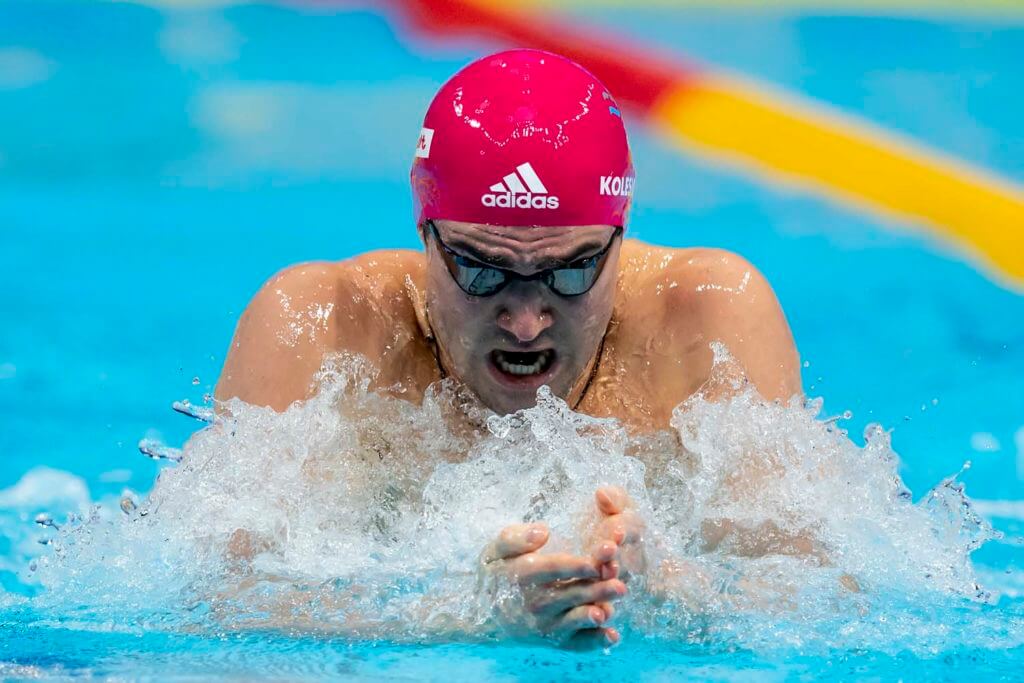World Aquatics to Allow Russian and Belarusian Athletes to Compete As ‘Individual Neutral Athletes;’ Paris Still Uncertain

World Aquatics to Allow Russian and Belarusian Athletes to Compete As ‘Individual Neutral Athletes;’ Paris Still Uncertain
Athletes from Russia and Belarus could soon be returning to international swimming competition after more than a year-and-a-half in exile. Most international sporting federations have banned athletes from those two countries since Russia’s invasion of Ukraine in February 2022, but in an announcement Monday, World Aquatics joined a growing list of international organizations prepared to welcome them back as neutral athletes. However, the path to Russian and Belarusian competition in next summer’s Summer Olympics is still uncertain.
World Aquatics stated that Russian and Belarusian swimmers and participants in other aquatic sports would be considered “Individual Neutral Athletes,” and only one athlete from Russia and one from Belarus would be allowed to compete in an event at any World Aquatics competition. That means the upcoming World Cup tour, which will feature October stops in Berlin, Athens and Budapest, and the next World Championships, scheduled for February 2024 in Doha, Qatar.
Notably, World Aquatics said that Russians and Belarusians “will only be permitted to compete in events where a time or result is established by the performances of a single athlete.” That would rule out participation in team events in any of the aquatic disciplines (and water polo entirely), and most significantly, that means no Russian relays could be entered.
The World Aquatics Bureau voted unanimously to approve the criteria for Russian and Belarusian return. The release stated that results of surveys conducted among international junior, elite and masters athletes “demonstrate strong support for the key criteria established, including the absence of active support for Russia’s invasion of Ukraine and the omission of national flags and anthems. Sixty-seven percent of athletes support the participation of individual neutral athletes who meet the strict criteria.”
The clause stating that no competing athlete can demonstrate “active support” for the invasion would seem to exclude backstroker Evgeny Rylov from a possible international return. At the start of the war, Rylov appeared on stage with Russian President Vladimir Putin in a pro-war rally.
However, two other leading Russians who could contend for Olympic gold medals next year, backstroker Kliment Kolesnikov and breaststroker Evgeniia Chikunova, would likely be eligible. Both swimmers recorded times this year that would have been good enough to win world titles, with Kolesnikov reclaiming the world record in the 50 backstroke while nearly breaking the 100 back mark and Chikunova demolishing the 200 breaststroke world record.
“The World Aquatics Bureau recognizes the dedication, commitment, and talent of athletes, regardless of their nationality,” said World Aquatics President Husain Al Musallam in the organization’s statement. “Despite the challenges we face on the international stage, we acknowledge our responsibility to foster a competitive, fair, and inclusive environment for every competitor. I would like to thank all those involved in developing the strict and fair approach we have agreed today.”
The criteria for Russian and Belarusian athletes to compete at World Aquatics events “will be implemented by the independent Aquatics Integrity Unit, set under strict criteria that include robust anti-doping measures.”
While this decision signals a Russian return in aquatics-specific events, their status in the Olympic landscape remains unclear. The International Olympic Committee has published recommendations for the return of Russian and Belarusian athletes to international competition, but the countries were not formally invited to the Paris Games. Currently, the most likely path to their participation in Paris would be as neutral athletes and with no multi-athlete teams competing. In swimming, for instance, the February 2024 Worlds in Doha presents the final opportunity for relay qualification for Paris.
World Aquatics advertised the support of a majority of athletes for those from previously-excluded nations to return to competition as neutrals, but there remains a significant bloc opposed. In February, a group of 35 national Olympic committees, including those from the United States, Russia and Germany, pressed the IOC to fully exclude Russia and Belarus from Paris.
More recently, the most successful Ukrainian swimmer in recent years, distance star Mykhailo Romanchuk, reiterated his strong anti-Russia position as he shared images from a Russian attack that destroyed his former training facility. On Instagram, Romanchuk wrote, “Sport is not politics?” while tagging the accounts of the Olympics, World Aquatics and LEN, the European swimming governing body.
Expect to see the argument of inclusion vs. exclusion continue over the next 11 months prior the opening of the Olympics. Those in support of inclusion will argue as World Aquatics did Monday that neutral athletes should not be punished for their government’s actions while those favoring exclusion will point to the inherent politicization of sport, which Romanchuk and other top Ukrainian athletes have experienced in full for more than a year.
Read the full announcement from World Aquatics here.

- EVENT PAGE
- SCHEDULE
- VENUE
- STREAMING INFO
- DAY 1 PRELIMS RESULTS
- DAY 1 FINALS RESULTS
- DAY 2 PRELIMS RESULTS
- DAY 2 FINALS RESULTS
- DAY 3 PRELIMS RESULTS
- DAY 3 FINALS RESULTS
- DAY 4 PRELIMS RESULTS
- DAY 4 FINALS RESULTS
- DAY 5 PRELIMS RESULTS
- DAY 5 FINALS RESULTS
- DAY 6 PRELIMS RESULTS
- DAY 6 FINALS RESULTS
- DAY 7 PRELIMS RESULTS
- DAY 7 FINALS RESULTS
- DAY 8 PRELIMS RESULTS
- DAY 8 FINALS RESULTS
- DAY 9 FINALS RESULTS



